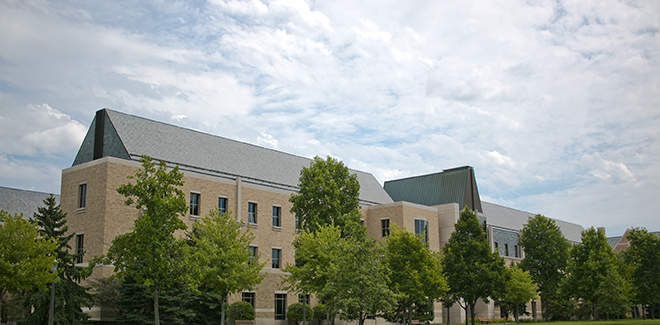The Mendoza College of Business at the University of Notre Dame has fluctuated in our rankings of the best undergraduate business programs, but they have always finished within the top 10 – solidifying themselves as one of the premier undergraduate schools. Mendoza ranked No. 7 in this year’s 2023 rankings, down just two places from last year’s No. 5. Of the three methodological categories, they placed best in Admissions, landing at No. 5.
Mendoza’s employment and internship outcomes rose slightly this year. A solid 93% of the Class of 2023 secured at least one business-focused internship before graduation, up from last year’s 92%, and 97.98% of the Class of 2023 landed a full-time job after graduation – nearly the same as last year’s 97.34%. As far as earnings go, the Class of 2023 reported earning an average of $87,000.
Over the years, their acceptance rates have become more selective. This year’s incoming class had a 12% acceptance rate – slightly more selective than last year’s 13.66%. This makes Mendoza more competitive than the B-school’s fellow in-state rival programs like Indiana University’s Kelley School (which accepted 34.83% of applicants) and Purdue Daniels (19%). Additionally, the average SAT score at Mendoza for the most recent incoming class was 1456, down slightly from last year’s average of 1466.
Being a B-school within a catholic university, the Mendoza education is best described as one that teaches students the importance of growing the “good in business” — a practice that the school prides itself on.
As it advertises on its website, Mendoza states, “This is not an era for business as usual. Too much is at stake—in our world, in our workplaces, in our communities. This is an era for virtuous individuals, with diverse interests and uncommon potential, to lead human enterprises forward. And this is an era for a business degree that gives those purpose-driven leaders the tools to connect their gifts to a better future for all.”
FORESIGHT IN BUSINESS AND SOCIETY
Mendoza’s signature undergraduate course is called “Foresight in Business and Society,” a required course for all junior-level students at Mendoza. The capstone course is designed to give students a view into the real-world and features guest lecturers, use of alternative class space and activities, a mentorship program, class discussions, and teaching by a diverse team of instructors. Throughout the semester, students take part in the Foresight Project where they test research and analytical skills and techniques by working in student teams to address complex problems.
“Your group selects a specific part of an industry and spends an entire semester researching everything about it (current trends, future projections, situational impacts) to produce a forward-looking report and presentation on it,” one alum explained in our alumni survey.
These types of experiential capstone courses are common at nearly every B-school, however, at Mendoza, there’s an increased emphasis on helping students “develop an awareness of important issues and trends affecting society, including issues related to sustainability” — further reinforcing Mendoza’s slogan of “grow the good in business.”
A RICH ETHICS-BASED CURRICULUM
The Mendoza undergraduate program offers a holistic education with a rich variety of classes in liberal arts, science, theology and other programs, and a foundation in ethical ideals. Mendoza students can choose from six majors including: accountancy, business analytics, business technology, finance, management consulting, and marketing.
“Embedded in course content is that underpinning of the ideals of community, human development and integrity that go back to the founding of the college in 1921 and the university in 1842,” Jean Meade, Rankings & Projects Manager at Mendoza, told us.
For students seeking a well-rounded, hands-on business education with an emphasis on “doing good” coupled with a strong network of support both during and after college, Mendoza is the perfect choice.
Alumni say:
“Exploring the Frontiers of Marketing Thought, a seminar style class. EFMT was academically challenging, and allowed my classmates and I to take a close look at the marketing field from an academia perspective – learning about various academic journals, discussing the field’s infrastructure and leading scholars, and conversing with guest faculty speakers on their own background, careers, and research. The class was conducted around the principles of exploration, dialogue, and learning for learning’s sake. It was fascinating, and without even realizing it, I took away both research skills & vital soft skills like posing good questions and communicating complex ideas to others that have helped me in my career.”
“I competed at a women’s stock pitch competition in Virginia my sophomore year of college. It was my first time formally pitching a stock to a group of strangers. I also got to hear from many women who work in the investment industry.”
“I did undergraduate research with the Well-being at Work team at Notre Dame’s innovation park. With this Lily-endowed research team, I studied – what augments the work satisfaction and wellbeing of professionals. Our findings and insight into the corporate world gave me unparalleled soft skills, while at the same time the position gave me very practical skills in project management, SQL, protecting PII, and creating externally-facing reports.”
“For our digital marketing class, my team was given a budget to create and run online advertisements for a local startup. The agency to spend our budget on different types of ads and the dynamic learnings we gained from this project were both experiences that many don’t even develop in their entire professional career—let alone as undergraduate students.”
“Notre Dame’s business clubs (SIBC and Investment Club) provided me with the opportunity to work with professionals in the finance industry and develop skills that I deployed immediately upon entering internships and my full-time positions.”
“I participated in the Applied Investment Management course in which we manage a small portfolio of stocks within the University’s endowment. This provided hands-on, intensive training in analysis and understanding of finance concepts with real consequences and impact.”
“The Student International Business Council offered a wide variety of real-world case studies in various industries that helped me learn what type of work I was interested in pursuing post-graduation. Being able to present our findings and receive in-depth feedback from real world professionals was instrumental in building public speaking confidence as well as professional etiquette.”










